
“The Stamp Act was a direct tax imposed on the colonies by King George III. This act inevitably led to the American Revolution. Just as the Stamp Act did in 1765, Obamacare should act as a wake-up call” – Rand Paul
The Future Fiscal Drain of Obamacare
 The current debate on Obamacare is not over whether the US needs a system of universal healthcare. That debate has passed, successfully. There was the act in congress, a 2012 Presidential Election centred on the topic, and it was upheld in the Supreme Court. It is instead on whether the Affordable Care Act (Obamacare’s official title) is satisfactory in providing this service of healthcare, or whether it will end up like other failing federal fiscal programs that create a long term burden on their economy. It has the potential to do that because of the individual mandate.
The current debate on Obamacare is not over whether the US needs a system of universal healthcare. That debate has passed, successfully. There was the act in congress, a 2012 Presidential Election centred on the topic, and it was upheld in the Supreme Court. It is instead on whether the Affordable Care Act (Obamacare’s official title) is satisfactory in providing this service of healthcare, or whether it will end up like other failing federal fiscal programs that create a long term burden on their economy. It has the potential to do that because of the individual mandate.
The individual mandate requires Americans to purchase health insurance or pay a tax penalty, and it is showing to be Obamacare’s Achilles heel. One simple reason is that on average, males between the age of 21 and 35 see a doctor six times over that time horizon. To that subgroup, there is no value in buying insurance. It’s not to say males 21 to 35 have no reason to purchase health insurance; moreover, the financially burdening decision to sign up for a plan becomes irrational when compared to paying a penalty tax.
The system relies on the premiums paid by the young generation. From a business perspective, the widest margins are in the instances of the young and healthy adults, whom are exactly the ones not eager to sign up for Obamacare. So as the President of the free world touts about individuals who were formerly denied healthcare due to prior or existing health conditions (because of a requirement in the law that prevents insurers from denying coverage), the fact of the matter is currently the majority of Obamacare enrollees are either Medicaid recipients or individuals with health conditions. These people would represent customers for insurers with quite narrow or even negative profit margins.
Simply put, it’s a law of averages. Everybody buys into the system to pay for the costs of those who will unknowingly require its services. But when the law, from the outskirts, allows individuals who with the highest probability of not requiring health insurance to simply opt out and pay a tax, its longevity becomes questionable.
This leads to another shortcoming with Obamacare. The way the law is structured, excess costs incurred by the private insurance companies in some instances may be recovered from funds by the federal government. For example, according to an article in the Wall Street Journal this week, if insurers underestimate costs, they can be recovered from the Federal Government. That is one way to minimize the risk to insurers; however, back to the original problem, should Obamacare inevitably fail to attract sufficient healthy individuals to subsidize the cost of the more demanding ones in terms of health benefits, premiums will go up in future years as the costs of the program increases.
The individual mandate was the biggest political stalemate when passing the act because conservatives did not believe the government had the authority to force someone to buy a good or service, but the law passed. Inevitably, it is a tax. It costs Americans more via their insurance premiums, or smaller wages as insurance is provided by their employer. The service in return for their tax dollars is healthcare.
Add this to the list of other underfunded American entitlement program.
All investments contain risks and may lose value. This material is the opinion of its author(s) and is not the opinion of Border Gold Corp. This material is shared for informational purposes only. Information contained herein has been obtained from sources believed to be reliable, but not guaranteed. No part of this article may be reproduced in any form, or referred to in any other publication, without express written permission. Border Gold Corp. (BGC) is a privately owned company located near Vancouver, BC. ©2012, BGC.












